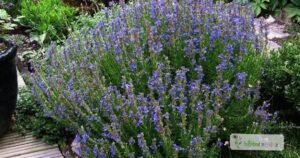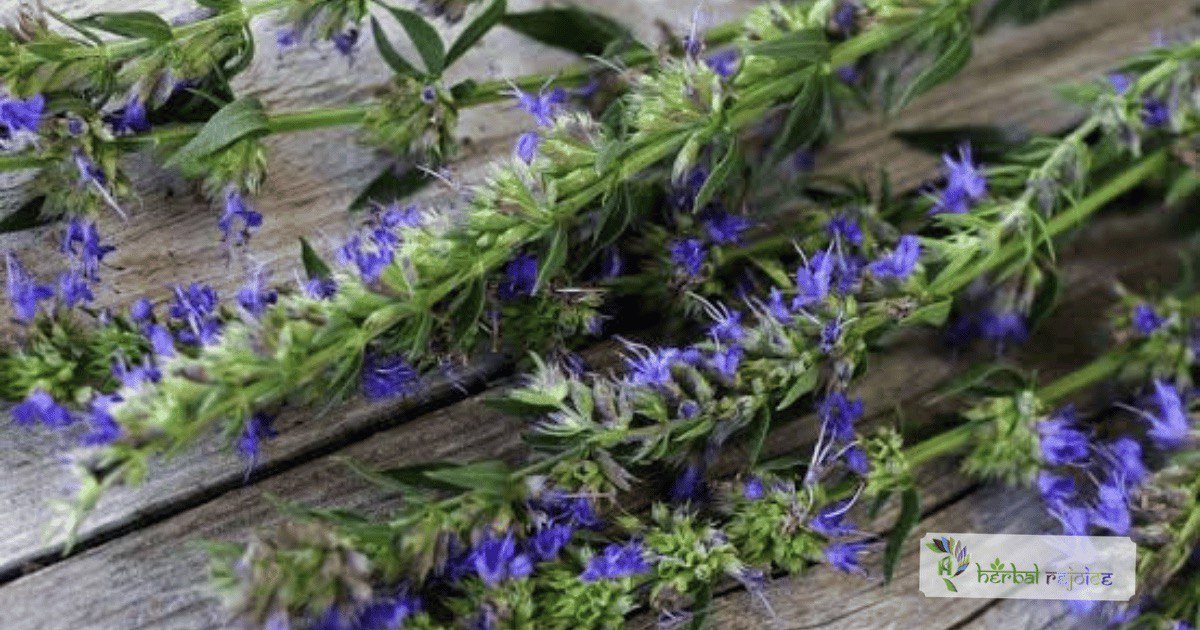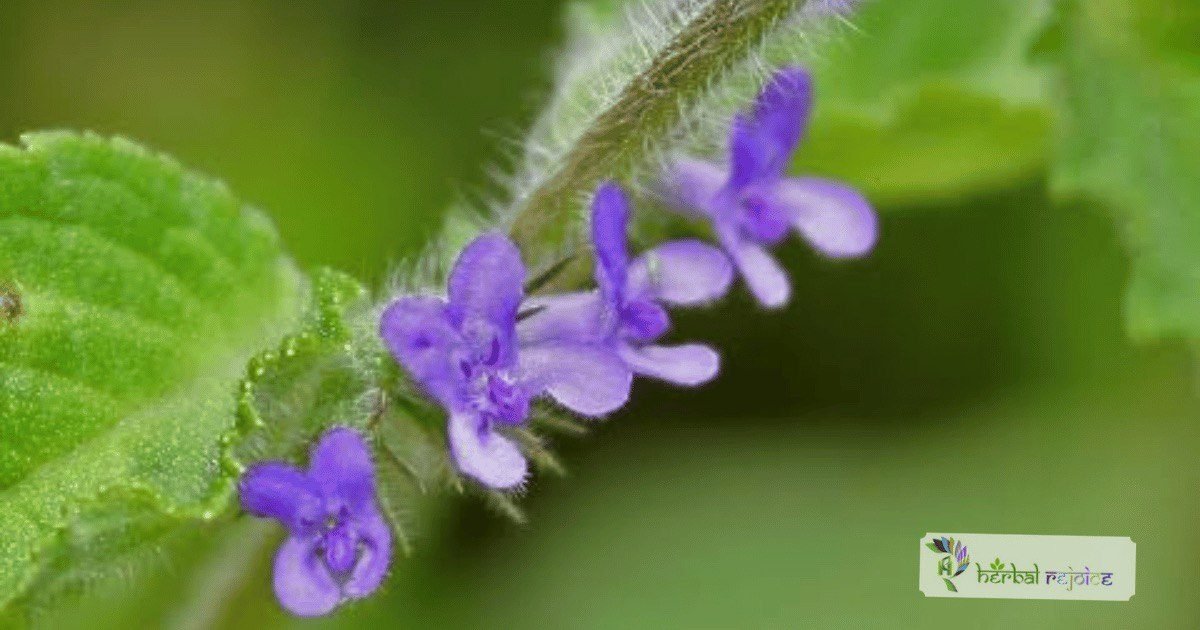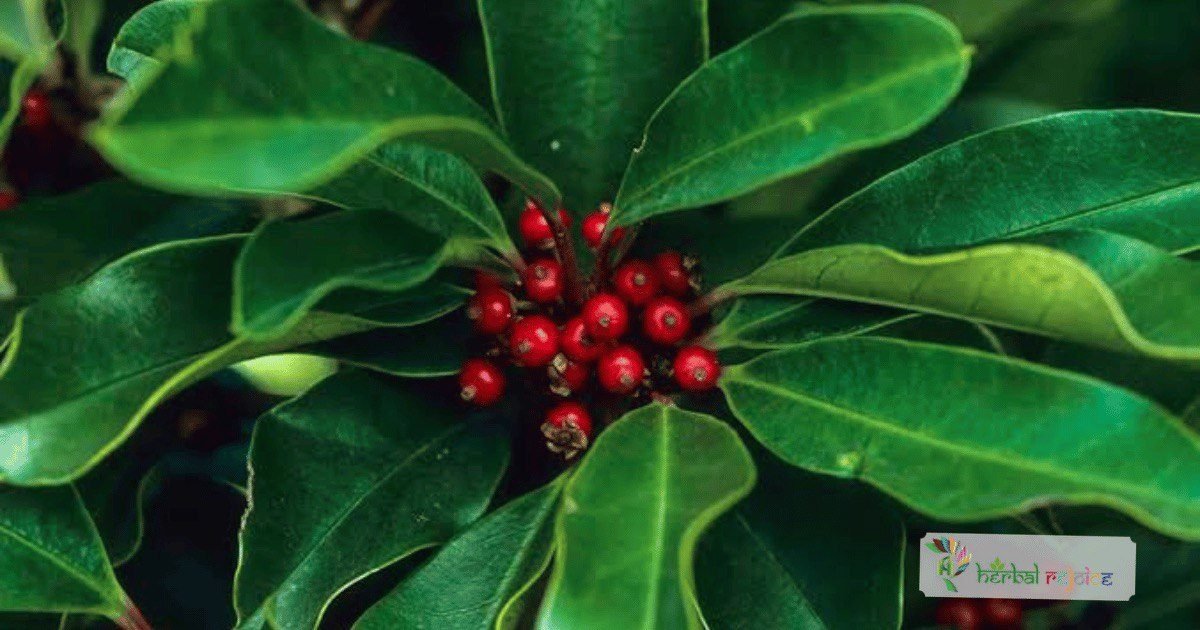Introduction:
Hyssop, scientifically known as Hyssopus officinalis Linn., is a perennial herb native to Europe and temperate Asia. Hyssop (Hyssopus officinalis Linn.) has been used to treat bronchitis, coughs, colds, and externally applied on bruises, discolored contusions, and cuts.

Names and Habitat
It can be found growing in the West Himalayas from Kashmir to Kumaon. Hyssop has a long history of medicinal use in various traditional systems of medicine, including Ayurveda, Unani, and folk medicine. This article will explore the various health benefits and uses of hyssop, as well as its chemical composition and potential side effects.
Health Benefits of Hyssop
Hyssop possesses diverse medicinal properties, making it a valuable herb for treating various ailments. It is known for its stimulant, carminative, sedative, antispasmodic, diuretic, and pectoral actions.
In Ayurveda, hyssop, also known as Dayaa-kunji, is used to alleviate symptoms of bronchitis, coughs, and colds. It acts as an expectorant, helping to clear the respiratory system of excess mucus and phlegm.
The British Herbal Pharmacopoeia recognizes hyssop as a key application for its expectorant properties.
Traditional Uses of Hyssop
Additionally, hyssop is believed to induce heavy sweating during fevers, aiding the body in reducing high body temperatures. It is also known to increase blood pressure, making it useful for individuals with low blood pressure.
In Unani medicine, it is referred to as Zuufaa or Zuufaa Yaabis, and is commonly used for its sedative and antispasmodic effects. Hyssop has also been used as an emmenagogue to promote menstruation.
Furthermore, hyssop has potential external applications. When applied topically, it can be beneficial for treating bruises, discolored contusions, and cuts. Its anti-inflammatory properties, attributed to the presence of ursolic acid, make it useful for reducing inflammation and swelling in skin injuries.
Chemical Composition of Hyssop
Hyssop contains various biologically active compounds, including terpenoids, volatile oils, flavonoids, glucosides, tannins, and resin. Marrubiin, a terpenoid, is a particularly potent expectorant found in hyssop.
The volatile oil of hyssop consists primarily of camphor, pinocamphone, and beta-pinene. These compounds contribute to its medicinal properties, including its expectorant and sedative effects.
Hyssop also contains an antioxidant compound called rosmanol-9-ethyl ether, which is found in the alcoholic extract of the aerial parts of the plant during flowering.
Active Compounds of Hyssop
This compound exhibits higher antioxidant activity than butylated hydroxytoluene, a commonly used synthetic antioxidant. Furthermore, research has shown that the extract of hyssop possesses weak hepatoprotective activity, offering some protection against liver toxicity induced by carbon tetrachloride in mice.
It is worth noting that hyssop essential oil can contain toxic constituents. Pinocamphone and isopinocamphone, found in the essential oil, are considered toxic. Therefore, caution should be exercised when using hyssop essential oil, especially in high concentrations.
Cultivation and Variability of Hyssop
It is interesting to note that the chemical composition of hyssop can vary depending on its geographical origin and cultivation conditions. Wild plants from Kumaon in Uttaranchal were found to contain minimal amounts of pinocamphone in the essential oil (0.61%).
In comparison, Himalayan hyssop contained a significantly higher percentage (38.44%), and cultivated North American hyssop had the highest percentage (42.66%).
This variation in chemical composition can affect the potency and potential side effects of hyssop, highlighting the importance of quality control in its production and usage.
Potential Side Effects and Precautions of Hyssop
While hyssop offers many health benefits, it is essential to exercise caution. The essential oil of hyssop, particularly when consumed in large quantities, has been known to induce epileptic seizures.
Pregnant and breastfeeding women should avoid excessive consumption of hyssop, as its effects on fetal development and lactation are yet to be fully understood.
Individual sensitivity to hyssop may vary, so it is advisable to consult a healthcare professional before incorporating hyssop into your healthcare routine, especially if you have pre-existing medical conditions or are taking medications.
Conclusion:
Hyssop (Hyssopus officinalis Linn.) has been utilized for centuries in various traditional systems of medicine for its diverse medicinal properties. Its expectorant, sedative, and antispasmodic effects make it a valuable herb for respiratory ailments such as bronchitis, coughs, and colds.
Furthermore, its antioxidant and anti-inflammatory properties contribute to its external applications for bruises, discolored contusions, and cuts.
However, caution should be exercised when using hyssop, as the essential oil can contain toxic constituents that may induce epileptic seizures when consumed in large quantities. Pregnant and breastfeeding women should also avoid excessive consumption of hyssop.
Frequently Asked Questions
What is hyssop?
Hyssop is a perennial herb native to Europe and temperate Asia.
What are the traditional uses of hyssop?
Hyssop is used in various traditional systems of medicine for treating respiratory ailments, as well as for its sedative and antispasmodic effects.
What are the health benefits of hyssop?
Hyssop has multiple health benefits, including expectorant, sedative, and antispasmodic properties. It can help alleviate symptoms of bronchitis, coughs, and colds.
Can hyssop induce sweating during fevers?
Yes, hyssop is believed to induce heavy sweating during fevers, aiding the body in reducing high body temperatures.
Is hyssop useful for individuals with low blood pressure?
Yes, hyssop is known to increase blood pressure, making it useful for individuals with low blood pressure.
What is the chemical composition of hyssop?
Hyssop contains various biologically active compounds, including terpenoids, volatile oils, flavonoids, glucosides, tannins, and resin.
What are the active compounds in hyssop?
Some of the active compounds in hyssop include marrubiin, camphor, pinocamphone, beta-pinene, and rosmanol-9-ethyl ether.
What is marrubiin?
Marrubiin is a terpenoid found in hyssop that acts as a potent expectorant.
Does hyssop have antioxidant properties?
Yes, hyssop contains an antioxidant compound called rosmanol-9-ethyl ether, which exhibits higher antioxidant activity than butylated hydroxytoluene.
Can hyssop protect the liver?
Research has shown that the extract of hyssop possesses weak hepatoprotective activity, offering some protection against liver toxicity induced by carbon tetrachloride in mice.
What precautions should be taken when using hyssop essential oil?
Caution should be taken when using hyssop essential oil, as it can contain toxic constituents that may induce epileptic seizures when consumed in large quantities.
Should pregnant and breastfeeding women avoid hyssop?
Pregnant and breastfeeding women should avoid excessive consumption of hyssop, as its effects on fetal development and lactation are yet to be fully understood.
Can hyssop be used topically for skin injuries?
Yes, hyssop can be beneficial for treating bruises, discolored contusions, and cuts when applied topically.
Does hyssop have anti-inflammatory properties?
Yes, hyssop has anti-inflammatory properties attributed to the presence of ursolic acid, making it useful for reducing inflammation and swelling in skin injuries.
Can the chemical composition of hyssop vary?
Yes, the chemical composition of hyssop can vary depending on its geographical origin and cultivation conditions.
Are there different varieties of hyssop?
There are different varieties of hyssop, including wild plants from Kumaon, Himalayan hyssop, and cultivated North American hyssop.
What are the potential side effects of hyssop?
The essential oil of hyssop, when consumed in large quantities, has been known to induce epileptic seizures. Individual sensitivity to hyssop may also vary.
Is hyssop safe for long-term use?
The long-term safety of hyssop is not well-established. It is recommended to use hyssop in moderation and under the guidance of a healthcare professional.





